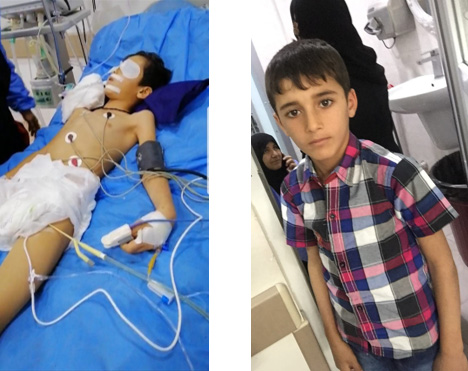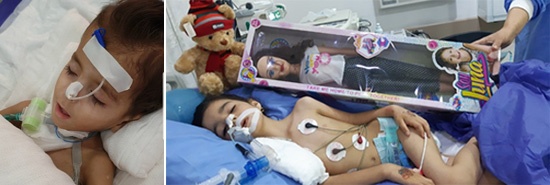Duhok, Iraq, 14 October 2020: Duhok Governorate in the Kurdistan Region of Iraq has pursued a proactive approach to improving health care services over the past 19 years, coordinated by the health directorate in the governorate and supported by the World Health Organization (WHO) and its implementing partners and generous donors.
 One of the projects nurtured by this approach was the renovation of Hevi Paediatric Teaching Hospital, with a focus on the expansion of the paediatric intensive care unit and the harmonization and maintenance of the paediatric wards in the hospital, built 16 years ago.
One of the projects nurtured by this approach was the renovation of Hevi Paediatric Teaching Hospital, with a focus on the expansion of the paediatric intensive care unit and the harmonization and maintenance of the paediatric wards in the hospital, built 16 years ago.
“Duhok Directorate of Health has undertaken in a chain of projects, including in paediatrics, mental health and essential health care services. These projects were implemented according to the Directorate's vision and the priority health needs of the community in Duhok, where a considerable number of refugees and internally displaced persons(IDPs) are still hosted,” said Dr Nizar Ismat Director-General of Duhok Directorate of Health.
More than 2 million beneficiaries have so far benefited from the renovation, expansion and reconstruction of health facilities dedicated to primary and secondary health care services in the governorate.
“WHO has invested considerable technical and financial resources in support for many health programmes in Duhok,” said Dr Adham Rashad Ismail Abdel Moneim, WHO Representative and Head of Mission in Iraq.
“We highly appreciate the generous contributions from our donors and implementing partners and hail the role of Duhok Directorate of Health in leading a successful collaboration for the priority health needs of the governorate,” he added.
As of 20 September this year, more than 3200 patients with severe congenital diseases were admitted to the critical and intensive care units for specialized health services. Heman Adnan, who is 7 years old, reached Hevi health facility with an inflammation of the brain and status epilepticus (a medical emergency that could lead to permanent brain damage or death). He remained in the critical care unit of the hospital for 3 weeks and was discharged less than a month ago in a good health condition.
“We were hopeless and helpless,” said Adnan Fouad, Heman’s father. “But my son was gifted life again thanks to the medical staff's efforts and I thank the health authorities and WHO for making such lifesaving services available to Duhok's citizens.”
 Yara Salim, 4 years old, was treated from rapidly progressive Guillain-Barré syndrome at Hevi Paediatric Teaching Hopsital in Duhok. Photo: WHO Iraq.Heman Adnan, 7 years old, was admitted to Hevi facility with inflammation of the brain and status epilepticus and was discharged after a full recovery. Photo: WHO Iraq, 2020.
Yara Salim, 4 years old, was treated from rapidly progressive Guillain-Barré syndrome at Hevi Paediatric Teaching Hopsital in Duhok. Photo: WHO Iraq.Heman Adnan, 7 years old, was admitted to Hevi facility with inflammation of the brain and status epilepticus and was discharged after a full recovery. Photo: WHO Iraq, 2020.
Yara Salim, on the other hand, who has suffered from a history of rapidly progressive Guillain-Barré syndrome (a rare disorder in which the body's immune system attacks the nerves), developed complete paralysis of the respiratory muscles. Yara remained on a ventilator for 6 weeks and a high flow nasal cannula (HFNC) for another 6 weeks, but was discharged home in March 2020 in a better condition. Following up with her family, we learned that little 4-year-old Yara had made a complete recovery.
There are many such human stories to this vital health project in Duhok. Many young lives have been saved and have recovered to enjoy a healthy life again, owing to the efforts of the Duhok Directorate of Health, WHO and generous contributions from donors such as the European Civil Protection and Humanitarian Aid (ECHO), the implementing partner Associazione Italiana per la Solidarietà tra i Popoli (AISPO), the United States Agency for International Development (USAID), the Bureau of Population, Refugees and Migration (BPRM) at the US Department of State, and the governments and peoples of Germany and Japan.
“WHO has a medical and moral responsibility towards the in-need population, whether in refugee or IDP camps or the community in general. We are proud of the model led by the Duhok Directorate of Health and will continue supporting the government to provide specialized services of a lifesaving nature,” said Dr Ismail.
For more information, please contact:
Ajyal Sultany
WHO Communications Officer
+964 7740 892 878
Pauline Ajello
WHO Communications Officer
+964 7729 877 288
Mohamed Lashkri,
WHO Communications Officer
+964 7740 892 979








